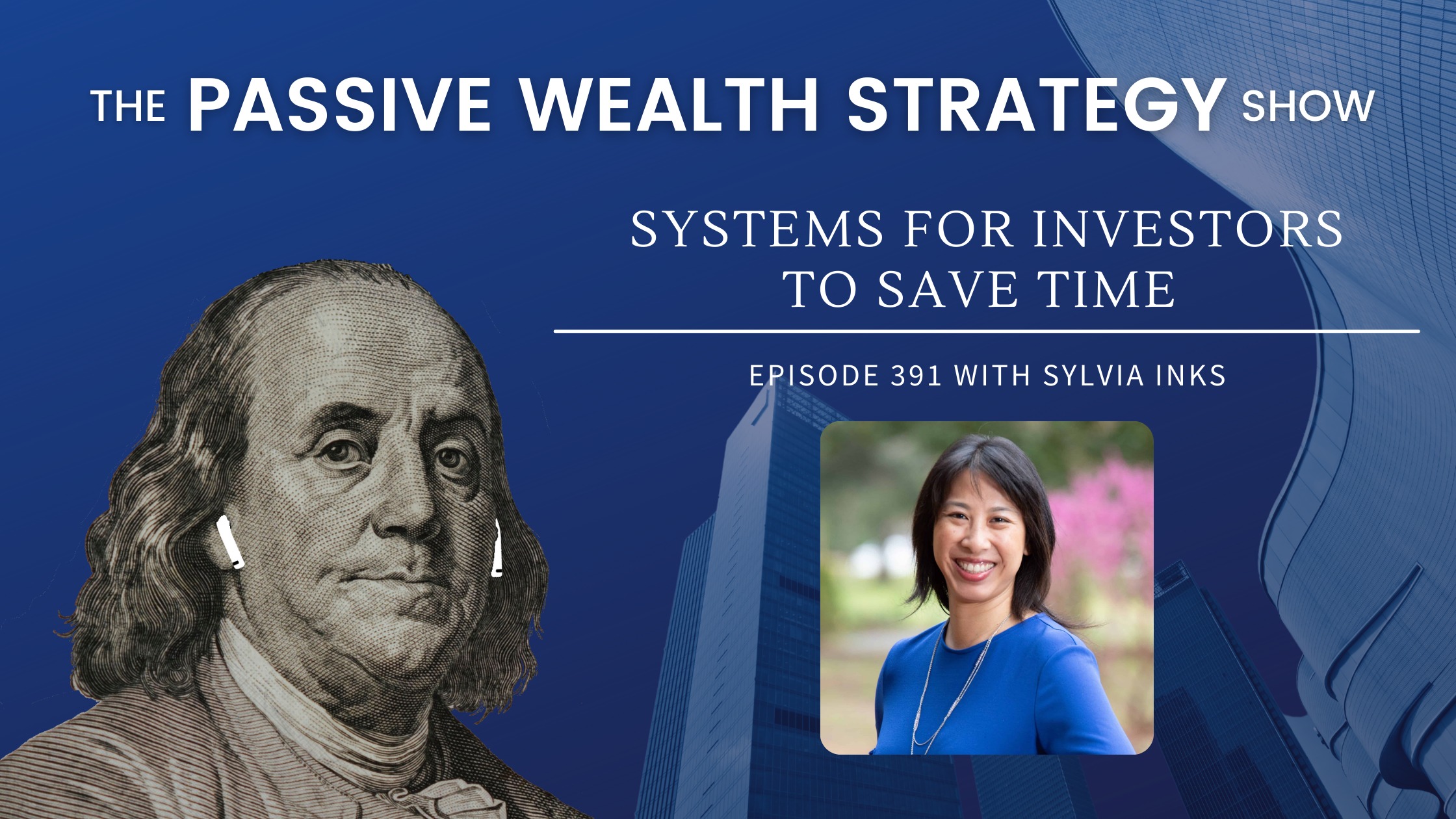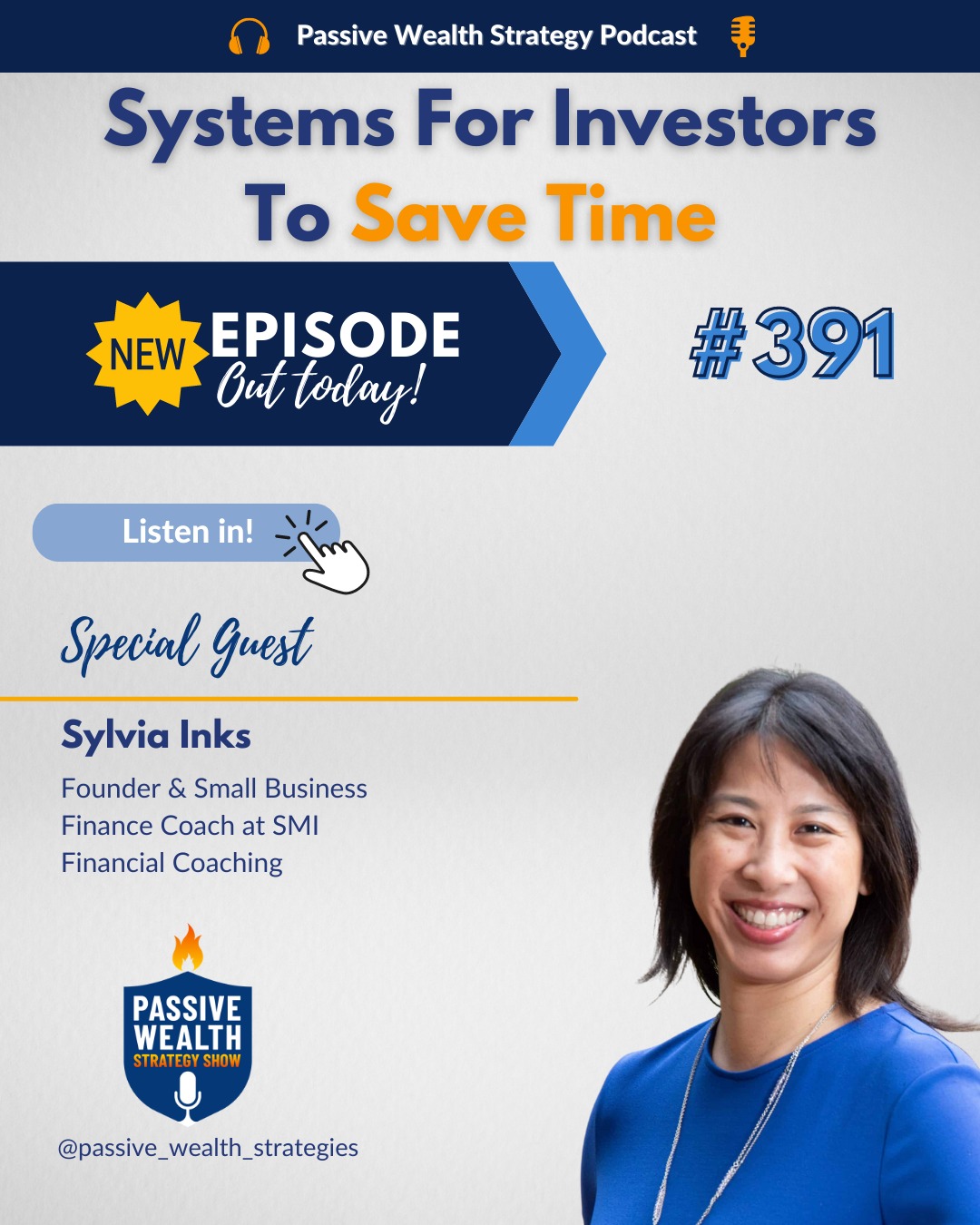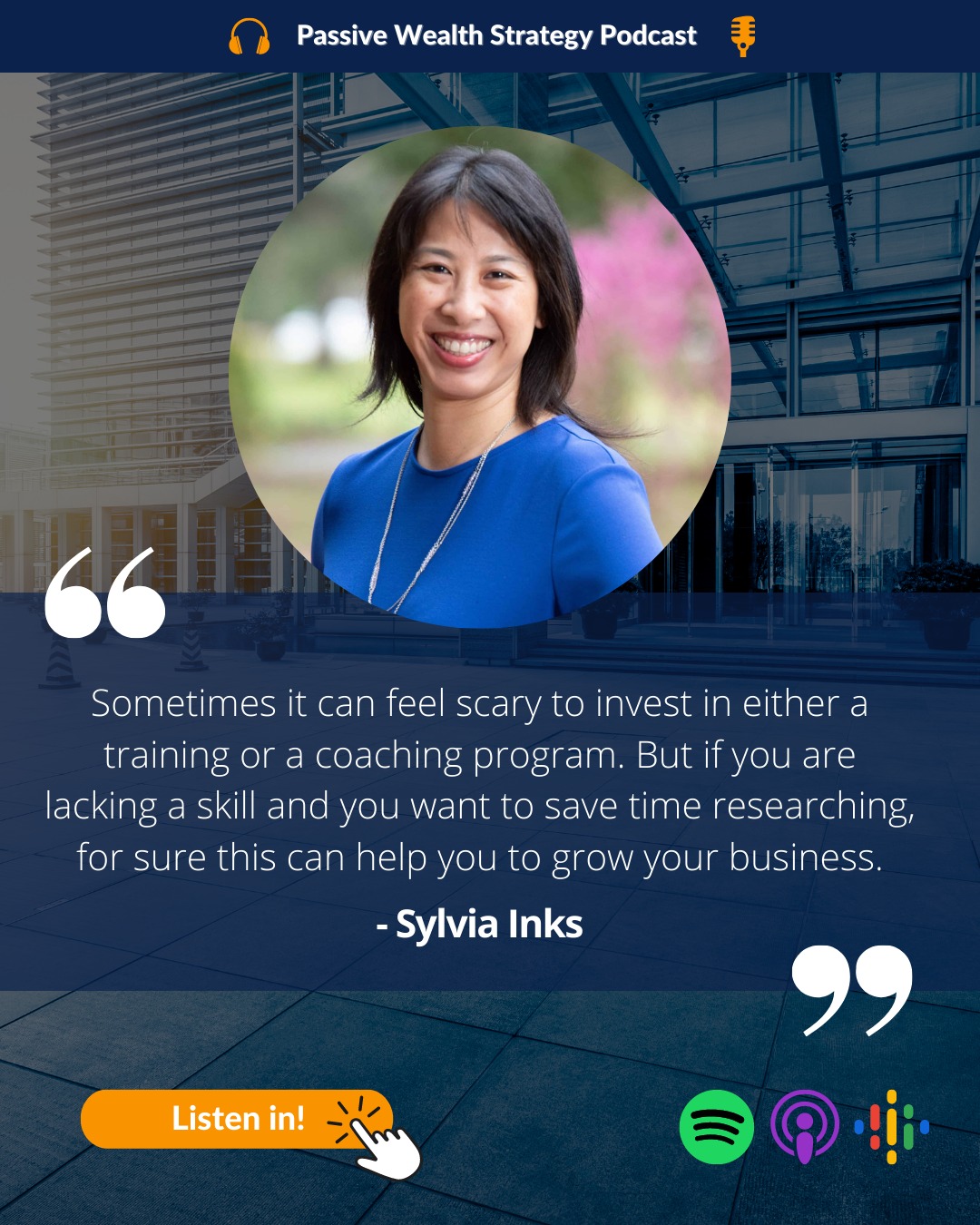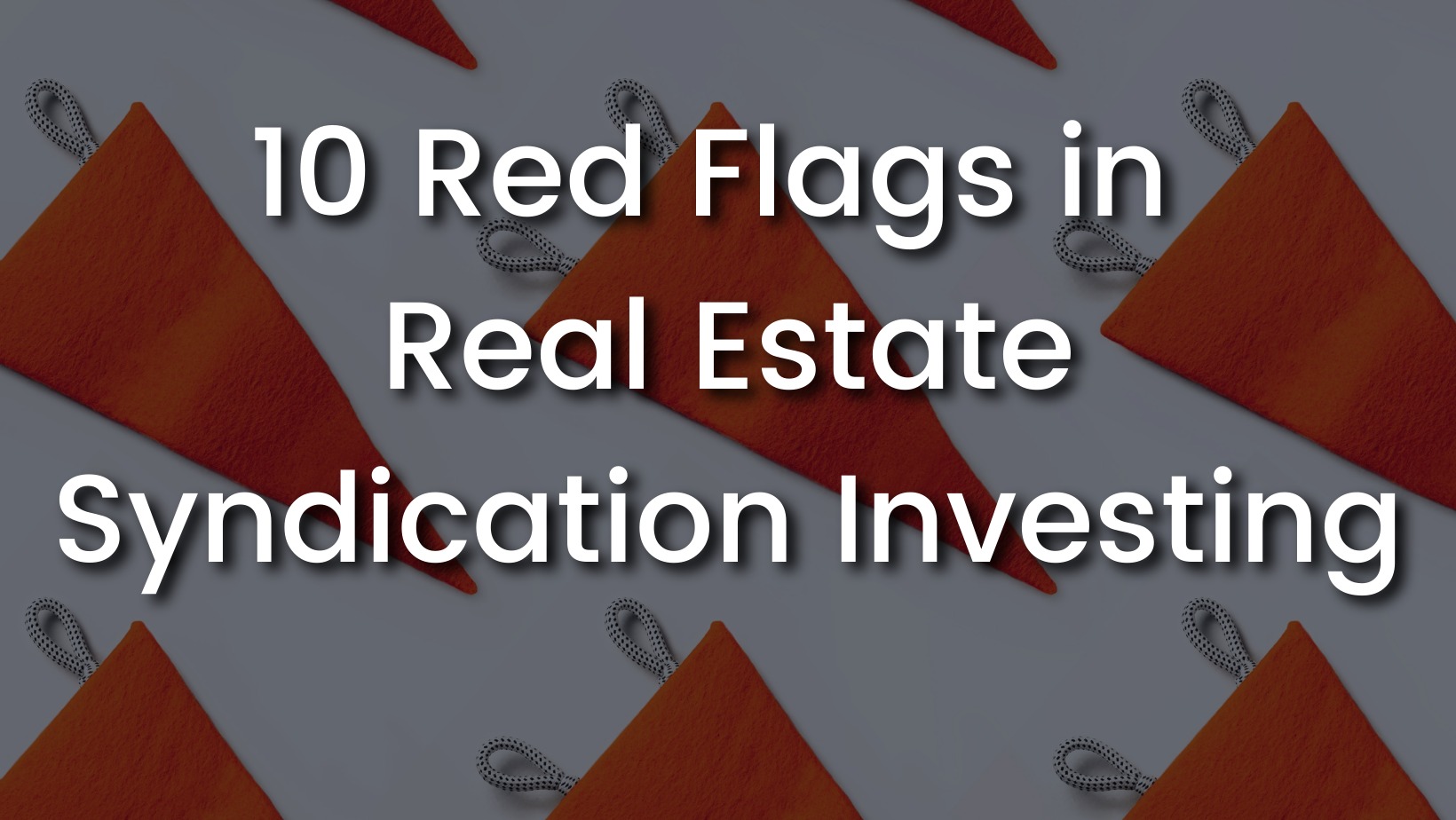
Systems For Investors To Save Time With Sylvia Inks
Sylvia, Thank you for joining us today. Thank you for making me well today. I’m hoping that our listeners can learn some business ownership and entrepreneurship skills as they relate to running a real estate investment portfolio for our listeners out there who don’t know about you and what you do.
Can you tell us a bit about yourself and your background and how you help people become better entrepreneurs in business?
Yes. So I’m a business strategist, a finance expert, and a speaker. I love helping small business owners know how to make sense of their numbers so they know what to do differently and also build multiple profitable income streams.
I see so many small business owners who are really good at what they do, but they just have a hard time keeping the money that they’ve earned and scaling their businesses.
Nice. Nice. And yeah, today we have a few topics that we want to cover here. First off, let’s kick it off by talking about expensive financial mistakes to avoid as a business owner.
The first rule of investing right is: don’t lose money. And the second rule is referred to as rule number one, in case you’re ever confused. So let’s talk about that. Let’s dig into the expensive financial mistakes that entrepreneurs can make. I love the data and numbers-driven approach that you’re taking here.
So tell us all about it.
Yes, so the biggest one that I see so many small business owners make, even those who have been in business for a few years, is co-mingling their business and personal money. And what do I mean by that? It’s putting all the money coming in from your business into your same personal bank account. Check your personal checking account.
All of a sudden, all your personal money and your business money are all commingled. Then you have no idea how much the business has made or how much the business is spending. And it also translates into an IRS nightmare because, all of a sudden, if the IRS needs to audit your business, they’re going to have to go through all your business and all your personal transactions.
And that’s very costly, especially if your CPA is doing your taxes and has to do things on your behalf. They’re going to be charging you per hour to go through all those transactions.
So oftentimes in real estate, when we hear folks mention that in particular, they’re talking about piercing, the corporate veil, liability and all of that, and it sounds like the angle that you’re coming at it from is more managing cash flows, knowing how much you’re spending and really knowing how much you’re making. Is that right? Am I getting that right?
Yeah, It’s two-fold but yes, absolutely. You’re going to lose money, right? If you co-mingle, you’re going to accidentally spend either the business is going to accidentally spend more money than it should.
I had an example where I had a colleague who was running her business out of her personal family joint account. And she didn’t think anything more of it because it was a side hustle. And all of a sudden, she didn’t realize that when she signed up for some coaching program, she actually spent her daughter’s dance money, the money that was set aside for dance money, as well as their upcoming vacation.
So all of a sudden, like you’re there, they can create resentment in the family. So if you’re overspending or over-investing in your business, you’re not spending the money that the business earned. Then your family is going to suffer. They’re not going to have them. You’re not going to have the money for the goals that you set aside for your family.
So, in that case, is the answer as simple as walking into your local bank branch and saying, “Hey, I need a business account, and it’s fun to get”? Is that really what it comes down to?
Yes, it’s just that simple. go to a local bank. I’ll always love community banks over big national banks.
Because a lot of times, the big national banks tend to have maintenance fees. So you have to keep a certain amount, or I’ve had clients that didn’t realize they were getting charged $25 a month for their bank accounts when they could just go to a local branch and get a free checking account. Yes, absolutely.
I just go to our local bank and open a separate business bank account. You’ll want to attach it to your ER, the business EIN number. So make sure it’s not attached to your personal social security number. So again, make sure the liability is on the business side, but do an EIN number. And actually, I also recommend people have more than one business bank account.
We’ll get into why that actually goes into mistakes number two and three but definitely have at least a business bank account separate from your personal bank account.
Awesome. All right. On that note, let’s move on to numbers two and three. I like that we found a problem and there’s a relatively straightforward and simple solution to it, but it is a mistake that a lot of folks make.
So let’s move on to the next one.
Yep. So, mistake number two. I see people don’t have an emergency fund for their business. So everyone here is so much about, oh, you’ve got to keep three to six months of emergency for your personal life, but people forget that you should have one for your business.
And I’ve had a few folks tell me, “Oh yeah, I’ve got an emergency fund.” I’m like, “Okay, great.” Where, where is it? And then come to find out, they’re just saying that their personal bank account is there an emergency fund? I’m like, “No.” If your personal life and your business both have an emergency at the same time, who gets to use the money?
So your business should have its own business or emergency fund.
So, as much as possible, treat it as a separate entity from yourself, so that if it, or this entity, has a problem, the entity must be able to deal with the problem. Yep, absolutely. So, that equates to having more cash in the bank, just in multiple places as well, right?
Yes! So, once again, an emergency. So if, for some reason, you have a tenant that’s not paying rent, right? Or something happens like you have money set aside, but otherwise, you don’t want to have to dip into the family fund and say, “Oops, we can’t pay for Susie’s dance lesson or Bobby’s soccer lessons because we have a tenant that can’t pay.”
So again, treat it as a completely separate entity from your personal life.
Okay, nice. Nice. I like that. and then moving on to number three. What is the figure?
three? Number three is having a separate bank account for your taxes. So I see a lot of times when people will get that big check or their rent check, and they think that’s all the money that they can spend all that money.
But really, you’ve got to make sure that when your IRS tax bill comes, and whether it’s your property taxes or your income taxes, you’ve got money. Set aside to pay the tax bill. because you can’t put that on credit. If you don’t want to, you’ll get penalized. So just go ahead and make sure you factor in, talk to your CPA, and make sure that you know how much you should be set aside.
So that you’ve got the cash ready on hand. When you get the tax bill, you’ve got to pay it off.
So, in the end, It comes a lot down to, in that case, the planning, right? Hey, this is what the bill is probably going to be for this year. We can set that money aside, maybe over the course of the year, really, whatever works for us in our individual case.
And then when the time comes to pay up, if it’s a property tax bill or whatever, it’s ready to go. And it’s not a problem. It’s not a big surprise or crunch.
Yeah, absolutely. That way, you can plan for it. And you’re not having to scramble and figure out where to pull the cash from.
Yeah, okay, okay,
Interesting. So are there any others in the list that we need to go through of mistakes that folks are making?
Another big one is probably just trying to do everything. If you’re trying to grow a business or scale a business if you’re trying to do it all yourself like you are the doer and the leader of the company, something’s going to give, whether it’s your personal life or your health or your sleep, something’s going to fail.
So figure out what the tasks are that you’re consistently doing, like a recurring task that you’re always doing for your business, and figure it out, price it out, and figure it out. Is this something I could pay someone $10.15 an hour to do and gain back that time for whatever you need, whether it’s a personal life, family, exercise, or sleep?
Because I will say, the biggest thing that I hear from small business owners is that they don’t have enough time there. They’re sacrificing sleep in order to run their businesses.
That one really rings true for me. That’s a mistake that I made for a long time as I was doing a lot of these tasks that had varying degrees of difficulty.
But I can get it done. I can make the time. I can make it happen. But if you’re working on those tasks, then you can’t be thinking about higher-level activities to grow the business and really, move upward, whatever your business is. And at least in my case, hiring people to handle those things has really been an investment in the business.
So it does impact your cash flows. It helps you really get to the next step in your business, whatever that is. But it’s tough at the beginning.
It can be tough. And that’s where I always encourage people. Keep a list of the tasks that you’re doing for your business. What are the things that you enjoy doing versus what are the things that you don’t like doing?
And it takes you 10 times as long to figure out what your yield per hour is. That’s another exercise I have. I like to give clients what to do, which is to figure out what’s Can you earn more in an hour than you paid for this task? So if you could earn $150 an hour, it’s like paying somebody $15 to do a task. It’s like a no-brainer, right?
That’s because you’ve got an immediate ROI. If you could just spend that one hour on money-generating activities.
So we’ve seen it over and over again. and. I dunno, over a decade, right? With the growth of the virtual assistant industry, I have a number of assistants who work in my business and do listen to this show throughout the course of doing their job.
Are you of the mind that virtual assistants can be used for virtually any business? We hear that a lot. But sometimes having someone physically present is an advantage. So what are your thoughts about it?
I love having my virtual assistant. She’s given me back.
Gosh, I would say over 800 hours a year easily. and allowed me to focus on things like building an online course for my business and earning that. I made so much more money by having her do the tasks that I didn’t need to do. Those were administrative tasks. So definitely, there are ways that you could hire a virtual assistant to do it, whether it’s follow-up emails or even just emails.
I have my client and may be able to send emails and reminders to my client. So something. I didn’t need to physically be there to send the email. She’s got the notes. She can send it or she can say, “Hey, here’s a reminder that you’re meeting with Sylvia in two days.” Here are the action items that you were supposed to get done.
These are super simple tasks that somebody doesn’t need to be present for. We meet virtually once a week on Zoom. They create their presence and relationship there. And then, sometimes, honestly, you can hire a virtual assistant to help with personal tasks. Because if it’s, if you’re free if you need to free up time that you would normally need to do for a task in your personal life but you need to spend that hour in your business, it probably makes sense to hire, have your VA do that research so that you don’t need it.
So sometimes I will get into a crunch where I need to do some research. You know, it takes three hours to do some research on my personal life, and I don’t need to do it. I could work in my business for three hours and make money. So I’ll have her do some of those tasks as well.
Interesting. So that one, in particular, is something that I’ve personally the personal tasks angle.
It’s something that I’ve thought about. And I haven’t been able to really think of anything that I can. Outsource it to a virtual assistant. So in your case, I guess comes to mind? I don’t know. I racked my brain. I can’t think of anything, but maybe I’m not being creative enough.
I don’t know.
What, I was a simple one? Oh, I was going to do a work trip in Asheville, North Carolina, and I wanted her to do some research on VRBOs. And so she, I said, spent up to two hours looking for VRVO rentals and gave me the link to the property. Tell me how much it is. Tell me, just create a spreadsheet so that I can easily see the top 10 places that you know that I can go to.
So that’s one simple one. Another one I think I had was that I’m in the process of moving later this year. So I said, “Go find me, movers, go on Yelp.” And again, the same thing. I’ll timebox it. I don’t like it. I don’t want her to go out searching for a one-time result, but I’m like, “Hey, timebox searched for two hours.”
Put a list together of moving companies that have been rated four stars or above. So there are little things like that. So anything that frees up time that I would’ve spent needing to go on the internet, look through reviews, et cetera.
Interesting. Okay, okay, they can’t go to the gym for you, but they can do that.

Systems For Investors To Save Time With Sylvia Inks
They can’t go to the gym. But I will say, creatively, I’ve also done this for clients as well. And I did this when I wrote my own book. I hired somebody locally just to take care of personal tasks. Just general housekeeping, no meal preparation or laundry housekeeper’s health. I had a client of mine who recently had the same thing go through her.
She was like, “I don’t have any time to work on my business or I’m running out of time because I’m doing all these personal tasks.” I’m like, tell me what personal tasks you don’t enjoy. And we listed, she listed a bunch, and I said, Let’s find somebody on care.com like list, all the things that you’re looking for and see who responds back.
And she was able to find someone that was cheaper than her current housekeeper/cleaner. And that person also enjoyed folding laundry. And she was like, when she was like the first one, when they come over and clean, they can also fold laundry. If you’re just thinking of little things that would make your life easier, whether it’s at home or in person, you could find somebody that’s more of a personal assistant to take care of personal tasks or a virtual assistant.
Again, a virtual assistant would probably be more useful for things like research or follow-up emails. Things like that
No, it’s okay. I bet one of the ones that really come to mind for me that I’ve been using more often is just the ability to order your groceries online and shoot out.
I’ll go pick them up. because it’s not that far away. And it’s on my way to the gym. Well, I can defer my route for 30 seconds to go sit and wait for the groceries to be loaded into my car. But then I’m not spending 15, 30 minutes, whatever, walking around the grocery store, picking it out.
I just get what I need, and what do you know? I’m not walking. Picking crap off the shelves that I don’t really need avoids the impulse purchase. So there are so many options that are now on the virtual assistant. In that realm, that can be discouraging though, because the reality is that, from my experience, you kind of end up hiring a few people till you find someone that is really a good fit for the position and is going to perform to what you need and be consistent in showing up consistently. Does that happen to everybody? And if so, how can you learn from those experiences and get to the point where you’re successful with virtual assistance?
Yeah, that’s a great question. I’ve been fortunate with the virtual assistant.
One of the questions that I asked, which I tend to like to ask my virtual assistant and staff, is to tell me what tasks they had really enjoyed. I’ll say, “Name me three tests that you really enjoy doing, and name me three tests that you absolutely hate to do.” And so, if I find the right fit but there’s one task that they really just despise doing, I might try to figure out a way to get that task done by somebody else on the team.
So, again, trying to keep people happy, if I find, if I believe I’ve found the right person, but there are just a couple of tasks that they really don’t like doing, I try to do that. So again, they’re happy in their position. So that’s just one way that I like to do it. I’ve also heard people say they check in once a year with their staff and say, “Hey, is there anything that you would love?” If you could name one task that you could take off your plate, what would it be?
And sometimes, if it’s a task that could be done by somebody else like I’ve heard business owners do that, and just the way again, if you’ve got good people on your team and it just happens to be one task, that’s just the bane of their existence. You figure out a way to make that work.
So that’s just one example. But I definitely think you can also when you’re interviewing for VAs. I’ve also seen where people give us simple tasks to do with two or three VAs that they’re interviewing. And have them basically return the results so you can compare and see, like, how each candidate did on the task, and then you can pick the person.
So you could do tests. I’ve heard people do test tasks.
Okay. I think the first example, in particular, is a, perhaps I should add that at a, in my business, but I think the overall theme seems to be to go back to, Hey, you’re building a long-term relationship with this person.
I think you summed it up very well when you said that you want the person to be happy in the position. Because then they’re going to stay right. And they’re going to perform well. And really, what they’re doing is going to fit with what they want to do. So we talked. We talked about mistakes and people. I think another big part of any business is systems, right?
And there are a lot of digital tools and things like that out there that are available that could range in cost and all of that. But what are some systems that business owners and entrepreneurs should have in place to get things done and continue to scale their business?
The number one tip that I tell people they have to get is a scheduling tool.
If you are trading emails, numerous emails back and forth. If somebody wants to meet with you and you’re having to send multiple emails back and forth and say, “Oh, this time doesn’t work, can you meet this time?” It’s just a time suck. It’s just a terrible waste of everyone’s time. If you had a simple scheduling tool where you could lay out here the days and times that I’m available, the scheduling tool would check, and your calendar only displays what’s available, then somebody could just easily click on a link.
And you guys both have a meeting, and it’s on both of your calendars. So, a simple tool, I think that every time that’s one, that’s a no-brainer that you’re going to save so much time. You can find them for as little as $10 to $20 per month.
So it does. That’s how we got onto this podcast interview.
I have a For investors out there who want to talk to me about our company, what we do, and all of that, you scheduled a time with me on the calendar, right? This is when I’m available. This is where we could chat. great. But it does, at least initially, hurt to have that 10 bucks a month. This is just a calendar, like a calendaring tool, if that’s a word. But it’s really an investment in the business, and it can help you scale and avoid a lot of those back-and-forth emails.
Yeah. Actually, Yeah, and it seems like you mentioned it at the beginning. It might seem like a lot, but you never know if you’ve lost a sale.
In the back-and-forth email, I actually did lose a sale once I did have a scheduling tool, but none of those times worked for her. And what I should have done was create a special VIP link. because I really wanted to work with her. She was like a warm body; she was pretty much a warm lead. And by the time I was trying to find exceptions, times, and times to meet with her, she had already
So then I broke my role of going out by emailing back and forth because I couldn’t find anything on my regular scout scheduling tool. By the fourth email, she’s like, “Yeah, thanks for your time.” But I already found somebody that I could meet with sooner and I already booked them. Yeah, so that was a $3,000 sale that I lost because of their needing to go back and forth and email. We literally couldn’t find a date and time that worked.
But that’s a big deal. That’s a big lesson, right?
Because you can learn from that. And then there will be another situation like that. In the future, so you can be more prepared next time.
Yep. So I have a secret VIP link where I can send it to people who, if I’m, if it makes sense to go to exception times and meet with them outside those times, I will send it to them.
Nice. Okay, So we have a calendar tool. What else? What other systems do folks have in place?
Yes. Another two that you must have Everybody absolutely needs to have invoices and accounting. You need to have an easy tool that can load in all your income that your business has brought in as well as all the expenses because you will need a tool that can produce a profit and loss statement for your CPA to do your taxes.
So there you are. I went through this a little while ago, but what I remember about selecting one is that there are an insane number of options out there, and you could spend months sorting through them picking out the best ones. What are your thoughts about the best tools?
And then we can talk about actually utilizing the tool and not turning it into just another job.
So I know everyone has heard of QuickBooks. That’s the one that CPAs tend to use. Everyone knows it’s been around. The only thing is that QuickBooks is really difficult if you don’t. If you don’t have an accounting background, like it is, you don’t want to accidentally set it up incorrectly because it will literally take hundreds of dollars to supply somebody to refix all the categories.
So I did have one business owner who wanted to save some money and wanted to just have his office manager set up as QuickBooks and ended up having to basically tear down and tear out everything that he had. So, QuickBooks is a little bit difficult to get started with. I would say Mo QuickBooks is great for someone who has a retail business that needs to keep track of inventory.
What’s the beginning inventory? month-end inventory but if you have just a service-based business, I would highly recommend a tool. That’s more user-friendly for service-based business owners. The tool that I personally use is called FreshBooks. It’s really geared more toward the service-based business owner.
So just more tracking, like what’s the income coming in? What type of income category do you have? So you can see where your income is coming from and then expenses will easily be categorized. Here’s how much you spent on utilities here, how much you spent on meals and entertainment, et cetera, all the different IRS categories.
And so the auto automatically starts to break down into those categories for you. And they’ll have some that they can’t, the system can’t categorize. They’ll just say, “Hey, here are some that are uncategorized,” and you’ll go in and fix those. But otherwise, once you do that, it’s easy.
Literally, you can just click a button and it downloads a profit and loss statement that you could just send over to your CPA.
Interesting. Okay, so frequently like that, I think folks will really lean towards QuickBooks because it’s actually very well-known. They’d been around for a long time.
They’re owned by a huge company, and they have a lot of advertising dollars, but it’s interesting. You prefer fresh books. I think I had looked at that one, but I don’t, we didn’t select it, and I can’t remember why, but it’s interesting to hear that the actual user experience on the backend is generally what
Yes. And customer service is great with fresh books. I’ve called them in the past year and I have clients who have called them in the past. And someone actually picks up the phone within three rings. I think at the time, their SLA was three or three rings. But I will say, definitely. I’ve had clients who have paid for QuickBooks because they were told they needed an invoicing system, but it doesn’t matter if you have it if you never use it or if you never open it.

Sometimes it can feel scary to invest in either a training or a coaching program. But if you are lacking a skill and you want to save time researching, for sure this can help you to grow your business.
Sylvia Inks Tweet
So I had a client for eight years. I paid for QuickBooks but never used it. I didn’t know what the reports meant. And then we switched over to fresh books, and he was able to understand what his finances looked like. So again, it doesn’t matter. Some things well-known CPAs might tell you: Oh no, you really need fresh books.
Honestly, as long as you can send them a profit and loss statement, that’s all they need. Do your taxes. So PR books can do exactly that.
Interesting. Okay, okay, so what are your thoughts on how much a CPA should be? Dig into, or be involved with things like those, setting it up in the first place for those IRS categories and actually getting the system to the point where it’s giving you the correct profit and loss statement.
And it’s based on what the IRS says we can and can’t deduct.
For sure, if you’re going to use QuickBooks, you’re going to want to have a CPA involved. You’re going to want to make sure that’s set up properly. But if you use something like fresh books, you don’t need a CPA involved.
It’s literally user-friendly; you just connect your bank accounts and credit cards that you have running for the business. And it just imports all that data.
Interesting. Okay, okay. So what are some other systems? Are there any other systems? I have in this list, you know, before we move on to my three questions, I ask every guest on the show.
This is probably my last one that is absolutely a no-brainer to use as a cloud system. Don’t store all your files, like your business files, on your laptop or desktop, because if you get a blue screen, or you actually spill coffee on it, or what have you, you don’t want all your financial information for your business or key data, like information for your business, on your laptop or desktop.
So I have Microsoft Office 365 and store everything in the cloud for as little as $10 per month. And especially if you’re going to use people like virtual assistants or other people on your team, you want to make sure that you’ve got a portal, a place where everyone can store documents, so that if for some reason you do have VA turnover, you want to make sure that all those documents that they’ve worked on are in the system.
So definitely a cloud system like Microsoft’s Office 365.
Nice. Nice. Okay, we can have those. Those are either available or very affordable. I think Google Drive for two terabytes of cloud storage is yeah, 12 bucks a month or something like that per user. It’s really all it’s all. It’s not free.
But it was so cheap. It’s unbelievable.
It is, and it’s going to be well worth it. If your laptop crashes and you need to get on somebody else’s laptop, you can easily access all that data. Otherwise, you wouldn’t be able to run your business if all your data were sitting on your laptop.
Absolutely nice. I love it. So, a lot of great examples here, a lot of great knowledge for folks right now. We’re going to take a quick break for our sponsor. All right, Sylvia. I’ve got three questions. I ask every guest on the show. Are you ready? Yes, I am. great. first one What is the best investment you’ve ever made other than in your education?
I would probably sign up for my employee stock purchase plan. When I was working in corporate America, I was actually able to get into my stocks at a 15% discount on the market price. So at the time that my company went IPO, that’s this shot. Shares were about $15 a share. And today, I just checked this morning before we were recording, and it was just over $342.
Jeez.
Wow. So you’ve got a good deal there. That’s a good deal there. So it’s nice. Nice. We had the best investment. Now we go to the other side of that coin, the worst investment. What is the worst investment you ever made?
So I bought a condo in Chicago right before I got married. But then I realized that I really hated the Midwest winters and wanted to leave within two years.
And our plan was to always know it was going to be our starter home. So we said, “Okay, we’re going to turn it into a rental.” And just as we were leaving, our HOA had changed all the rules to limit rental properties. So they turned it into a lottery system and you could only apply. And once you got the slots, you were only limited to two years of rental at a time, and then you had to give up your spot.
So it was that they were really trying to deter rentals. And so we lost money since we sold within two years.
Wow. That’s pretty onerous. That’s an interesting restriction. Wow. Okay, my favorite question here at the end of the show is, “What is the most important lesson you’ve learned in business?”
Yes. This is a crucial lesson. I know that sometimes it can feel scary to invest in either a training or a coaching program that you know that you need to grow your business. Especially if you don’t have the cash on hand for it, or maybe you’re just not sure if you’ve got cash flow coming in. But if you are lacking skill and something that, for sure, this is what’s going to take to grow your business or scale your business, figure out how you can quickly earn the ROI.
There was a personal example a couple of years ago. I knew I wanted to invest in a sales coaching program. I’ve worked with a coach before and something similar, but she was coming to me for a 12-month coaching program. I was worried about figuring out how I was going to make the cash flow work to pay for it.
But honestly, within less than a month, I would say, yeah, less than four weeks, I was able to earn all my money back for the program. and just less than two weeks. So that’s everything I learned in the first month. So anything over that, I was earning ROI on it after a month, and it was a 12-month program.
Nice, awesome business coaches have really helped me get to that next level and continue to take steps upward. So I really appreciate that. And I want to thank you for joining us today. We’re going to have all these great lessons. If folks want to reach out, if they want to get in touch with you, if they want to learn more or anything like that, where can they track that?
Yeah. So my website is SMIFinancialCoaching.com. And then also, my best place is my book. I have my book on Amazon. It’s small business finance for the busy entrepreneur, and you can go to small fin finance business book.com.
Nice. Awesome. I think a lot of real estate investors, particularly at the beginning, don’t run their real estate investments like a business.
I’ll be honest, myself included at the beginning, but it’s an ever-improving process. This is how we learn. And I appreciate all these lessons that you brought to us today. If others have already stated this.
You can ask me again. Actually, I think I just gave you the wrong URL. So hold on.
All right. All right. All right. We’ll edit this. We’ll edit this and make it work.
The last part. Yes.
All right. Let me know when you’re ready.
I am.
All right. Sylvia, thank you for all the lessons that you’ve provided us today. If folks want to reach out, if they want to get in touch with you, if they want to learn more, anything like that, where can they track it?
Yes. Best Plays. Go to my book URL. It’s smallbusinessfinancebook.com. It’s my book called “Small Business Finance for the Busy Entrepreneur.” It’s essentially the 21, but it’s been expanded. So it’s 21 steps that I’ve seen that so many small business owners have gotten wrong in their business.
Nice. Awesome. And hopefully, people can take those lessons and actually apply them.
I’ve committed that sin myself in the past of learning things and then taking forever to apply them. And it’s a constant process of really trying to internalize these lessons and then applying them to your business. And I would encourage people to reach out, check out the book, and apply those lessons to real estate investments.
I want to thank you. Thank you for being here today. I want to thank everybody out there for tuning in. If you’re enjoying the show, please leave us a rating and review on the Apple Podcast. Five stars. If you don’t mind, guys, I appreciate that. So much that helps other people learn about the show because that helps us rank higher in the Apple podcast ecosystem.
And I’m always honest with you guys. That gives me a nice little warm and fuzzy feeling because I get to see that you’re engaging with the content and you’re escaping the Wall Street casino along with us. If you know anyone who could use a little bit more passive wealth in their lives, please share the show with them and invite them into the tribe.
Don’t forget to subscribe and catch us here every Monday, Tuesday, and Thursday. I hope you have a wonderful rest of your day, and we’ll talk again soon. Bye-bye.

Systems For Investors To Save Time
About our Guest

Sylvia Inks
Sylvia Inks is financial coach, presenter and author, specializing in helping small business owners save time, money, and reduce stress in running their businesses. Sylvia leverages her ten years of experience working with one of the world’s largest consulting firms and Fortune 500 organizations in financial services, insurance, healthcare, and technology, to now helping entrepreneurs improve processes, performance, and profitability. She holds a bachelor’s degree in business administration from the University of North Carolina at Chapel Hill.
Sylvia presents her “7 Secrets to Financial Success for Small Business Owners” to aspiring and seasoned entrepreneurs at Wake Tech Small Business Center, real estate teams, and community groups.
She is a member of Vend Raleigh, Triangle AMA, WBON of Cary, and Nonfiction Authors Association. She is the community lead for FinCon Local Raleigh, a financial blogger and media group.
Her clients say she’s energetic, compassionate, and is jargon-free for the finance-a-phobes. Her clients appreciate the hope and clear direction that she provides in coaching.
She has lived and worked in San Francisco, Seattle, and Chicago, and now currently lives in Raleigh, North Carolina with her husband and two sons.
Episode Show Notes
Sylvia Inks is financial coach, presenter and author, specializing in helping small business owners save time, money, and reduce stress in running their businesses. Sylvia leverages her ten years of experience working with one of the world’s largest consulting firms and Fortune 500 organizations in financial services, insurance, healthcare, and technology, to now helping entrepreneurs improve processes, performance, and profitability. She holds a bachelor’s degree in business administration from the University of North Carolina at Chapel Hill.
[00:01 – 12:00] Opening Segment
- Get to know Sylvia Inks
- Expensive Financial Mistakes Investors Make
- Co-mingling business and personal money
- No emergency funds
- Having a separate bank account for taxes
- Doing everything yourself
[12:01 – 18:30] Successful Virtual Assistants
- Sylvia shares the roles of her virtual assistants
- How to Maximize Your Virtual Assistants
- Finding Success with Virtual Assistants
[18:31 – 27:34] Systems for Investors
- Have a scheduling tool
- Make sure to get an invoice and accounting tool
- Don’t rely on local storage, invest on a cloud system
[27:35 – 31:56] Closing Segment
- Quick break for our sponsors
- The first step to growing your wealth is tracking your wealth, income spending and everything else about your finances, you can start tracking your wealth for free and get six free months of wealth advisor. Learn more about Personal Capital at www.escapingwallstreet.com
- What is the best investment you’ve ever made other than your education?
- Employee stock purchase plan
- Sylvia’s worst investment
- A condo in Chicago
- What is the most important lesson you’ve learned in business and investing?
- “Figuring out how you can quickly just earn the ROI.”
Connect with Sylvia Inks through smallbusinessfinancebook.com, LinkedIn, and Twitter.
Invest passively in multiple commercial real estate assets such as apartments, self storage, medical facilities, hotels and more through https://www.passivewealthstrategy.com/crowdstreet/
Participate directly in real estate investment loans on a fractional basis. Go to www.passivewealthstrategy.com/groundfloor/ and get ready to invest on your own terms.
Join our Passive Investor Club for access to passive commercial real estate investment opportunities.
LEAVE A REVIEW + help someone who wants to explode their business growth by sharing this episode or click here to listen to our previous episodes
Tweetable Quotes:
“Have a separate bank from your personal bank account.” – Sylvia Inks
“If you have good people in your team and it just happens to be one task that’s just the bane of their existence, you figure out a way to make that work.” – Sylvia Inks







